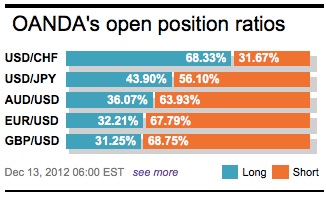The excuse for the less than extravagant response to the Fed announcement or the ECB’s new directive is that Capital Markets has a lot of digesting to do. Truth be told, it’s the season that’s in it and the predetermined decision by many, that until there is a strong US budget deficit signal, all bets are off until the New-Year. That seems a rather reasonable response given the pending liquidity and participation constraints that are about to unfold. The yen remains the story of the day within the G10, while the rest of the majors just trade ranges.
The burst of dollar strength in Asia was put down to one-off M&A flows. It seems that the failure to lever out USD/JPY 83.75 barriers has left many speculators ‘longs’ even more extended, easily allowing the market to flip flows to profit-taking sales as we head into North America. The EUR, thus far, has failed to benefit from news that the EU has agreed on a structure for ECB banking supervision across the Euro-zone.

The EU has laid the foundations for a wider economic union, marking the “first concerted attempt to integrate the bloc’s response to problem banks.” Member states have agreed on a common banking supervision framework that gives the ECB regulatory responsibility for banks within the Euro-zone with more than +€30b in assets or that have assets of +20% of their national economy’s GDP. That’s approximately 150 of the zone’s biggest banks. Also, the ECB seems to also have the mandate to intervene in smaller banks at the first sign of trouble. Non-EU members are able to elect if they want to allow the ECB to regulate their banks. It now seems that member financial sovereignty has become more of a “grey” line and another Euro subject matter sure to get more airtime one day. For now, the agreement is being passed over to the European parliament to be rubber-stamped.
The market continues to digest the extent of the FOMC’s decisions yesterday. The US Central Bank’s policy committee announced its intention to continue to purchase +$40b/month MBS and +$45b/month long-term Treasury debt into 2013, after “Operation Twist” concludes at year-end. The market had been expecting this. However, they also decided to announce numerical thresholds for unemployment and inflation that will guide the first Fed Funds rate hike, replacing the calendar guidance. The other surprise was the widening of the range of Treasury maturities that the Fed will purchase (from six to 30 years under OT and now, four to 30 years under QE3+).
There were no surprises from the Swiss Central Bank this morning. They reiterated their pledge to intervene in the currency markets to prevent the CHF from getting any stronger than 1.20 against the ‘single’ currency. With the franc overvalued, the Swiss economy at risk (who’s is not?) and inflation non-existent, the SNB will probably stick to their current policy well into next year. With the non-surprise decision out of the way, markets focus now turns back to Greece. The Euro finance ministers are gathering today to decide the disbursement of the next tranche of financial aid worth +EUR34b to the beleaguered country. Expected to be a slam dunk-however, very little seems so straightforward nowadays.

Investors are focusing on the December 5 EUR high (1.3127), through here and this market will be able to find its second wind. Filling in the gap, from last weeks move lower after the ECB rate decision and US’s NFP, has occurred rather easily so far this week. The 10 and 30-DMA’s remain positively aligned and investors seem to be overall long the EUR with a healthy average. This market is within striking distance of signaling overbought territory the longer we trade below the December 5 high. It’s worth noting that stop losses are beginning to accumulate at the figure, that’s the figure below!

Other Links:
Resuscitated EUR Keeps Ticking
This article is for general information purposes only. It is not investment advice or a solution to buy or sell securities. Opinions are the authors; not necessarily that of OANDA Corporation or any of its affiliates, subsidiaries, officers or directors. Leveraged trading is high risk and not suitable for all. You could lose all of your deposited funds.


